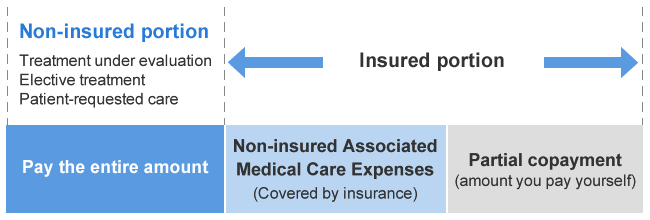Non-insured Associated Medical Care Expenses
Even if you receive medical care not covered by insurance, as long as certain conditions are met, you are eligible to receive benefits for care covered by insurance as “Non-insured Associated Medical Care Expenses”.
Non-insured Associated Medical Care Expenses

Combination of insured and non-insured medical care is permitted when certain conditions are met.
Generally speaking, under the health insurance system, if you receive medical care not covered by insurance, you must pay all medical care costs, even the portions normally covered by insurance. However, in response to technological progress in medical care and diversifying patient needs, even if you receive medical care not covered by insurance, benefits will be provided for the portions normally covered by insurance, as long as the non-insured medical care consists of treatment under evaluation, patient-requested care, and elective treatment meeting certain conditions.
Benefits in which such combination of insured and non-insured medical care is permitted on an exceptional basis are called Non-insured Associated Medical Care Expenses.
Treatment under evaluation
Treatment under evaluation for future insurance coverage, such as new treatment methods and new drugs whose medical value is as yet undetermined
Example of treatment under evaluation
“Advanced medical care”
You are permitted to undergo a combination of insured and non-insured medical care for advanced medical care technologies not covered by insurance if the technologies are recognized as advanced medical care meeting certain conditions in aspects such as safety and efficacy. In addition, you are permitted to undergo a combination of insured and non-insured medical care for advanced medical care considered “high-level medical care,” including unapproved drugs or medical devices.“high-level medical care,” including unapproved drugs and medical devices.
Advanced medical care technologies may be received from medical care institutions satisfying standards established by the Ministry of Health, Labour and Welfare.
Patient-requested care
Care such as use of pharmaceuticals not yet approved for use in Japan or use of those approved for use in Japan but for other than their approved uses, subject to accelerated approval as non-insured associated medical care requested by the patient
Flow from request through care
A patient who, following consultation with his or her family doctor or other healthcare provider, would like to use advanced medical care technologies not covered by insurance together with insured medical care, requests such care from the Core Clinical Research Hospital or from a special functioning hospital. After issues like treatment efficacy and safety are explained to the patient, he or she applies to the Japanese government for patient-requested care, attaching a written opinion prepared by the Core Clinical Research Hospital or other facility.
While screening of advanced medical care by the Japanese government traditionally took about six months, in the case of patient-requested care, this time in principle is shortened to six weeks (two weeks in principle for treatment administered in previous cases).
If the application is approved following the screening process, the patient will receive treatment at the Core Clinical Research Hospital or other facility receiving the request. However, depending on the results of the screening, the treatment may be provided at a medical care institution located near where the patient lives.
Elective treatment
Medical care chosen by the patient him or herself without regard for coverage by insurance, such as special medical environments
Examples of elective treatment
“Hospitalization using premium beds”
Insurance will not cover hospital rooms exceeding the typical standard (for example, a private room) during times of hospitalization. However, you may elect to pay the difference in room charges for hospitalization, in which case insurance will cover the rest. In general, this is known as use of “premium beds.”
“Dental treatment (when Non-insured Associated Medical Care Expenses are permitted)”
You are expected to pay the full cost of dental treatment involving methods or materials not permitted under the insurance system. However, cases such as use of gold alloy materials on front teeth and full metal denture are eligible for coverage as Non-insured Associated Medical Care Expenses. In such cases, you will be required to pay only the difference in cost. Be sure to carefully review matters such as treatment methods and costs when you seek out dental treatment.
“Elective treatment using (long-listed) brand-name drugs for which generic drugs are available”
From October 2024, for certain drugs, a surcharge equal to one-fourth of the difference in drug prices will apply if you request a prescription for a (long-listed) brand-name drug for which generic drugs are available.
See here for more information.





